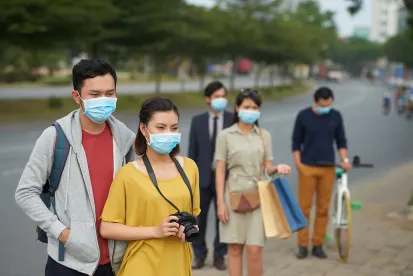Given the risk to life and the economic impact of coronavirus, policyholders and the insurance industry alike are watching and considering whether business interruption, event cancellation, or liability and workers’ compensation insurance benefits may be available while similarly assessing liability risks. This three-part series will cover specific aspects of insurance that all stakeholders – insured, insurers and brokers – should consider. Read Part 1 here and Part 2 here.
Coronavirus: Status and Impact
In response to the thousands of reported new cases of COVID-19 in countries around the globe, the World Health Organization (WHO) has upgraded their Risk Assessment for China, Regional Level and Global Level to Very High (the highest risk level). There are more than 90,000 confirmed cases of the virus. The United States is now reporting more than 100 infections as of Tuesday, March 3, 2020.
The Federal Reserve announced an emergency rate cut on March 3, but it was not enough to stop the market’s slide to new lows indicating that investors see the virus as a continuing threat to economic growth and corporate profits over the next several months. The Wall Street Journal reports that economists predict disruptions in the global and domestic supply chains could cause product shortages and hurt overall sales, but some U.S. retailers are noting strong sales as consumers stock up on food and other staples. In this third part of the three-part series, we will review Liability and Workers’ Compensation insurance factors that all insurance stakeholders should consider when claims under these policies are brought forward.
Liability Insurance
If the coronavirus continues to spread worldwide, insurers are likely to confront liability claims that span the spectrum of their insurance product lines.
General Liability Insurance
Businesses, particularly those that open their doors to the general public, may find themselves targets of claims that their negligence led to the exposure and infection of clients:
-
Exposure resulting in bodily injury or property damage
-
Negligence related to visitors to businesses or locations such as offices, daycare centers, retail shops, hotels and places of worship
-
Product liability related to air filtration and recirculation, particularly in situations involving airplanes and hospitals
-
Personal injury involving occurrences such as wrongful eviction or imprisonment
-
Constitutional claims involving the quarantine or restriction of infected or exposed persons
-
Negligence or other liability suits against a company or organization that fails to implement a pandemic contingency plan.
Of course, the target of such claims will be not only the business but also the business’s general liability insurance and its coverage for “bodily injury.” Policy exclusions may exist for claims arising from a pandemic, virus or bacteria. Many insurers also include broadly worded pollution exclusions that could serve to preclude or limit coverage.
Errors & Omissions (E&O) Insurance
There is an adage that the most likely place to get sick is in a hospital. Medical care and managed care providers purchase errors and omissions (E&O) insurance that provides coverage for bodily injury arising out of their providing or failing to provide medical care. While such policies generally preclude coverage for bodily injury to employees during the course of their employment (i.e., an employee being exposed to an infectious or contagious disease), such policies may respond to claims that a health care professional acted or failed to act in a manner that led to a patient (non-employee) contracting a coronavirus bodily injury.
Directors & Officers (D&O) Insurance
The coronavirus has roiled stock markets worldwide, resulting in ups and downs depending on whether the market perceives that the crisis is being managed appropriately and whether global supply chains will be impacted. Ultimately, how a company responds to the coronavirus may subject its directors and officers to the scrutiny of the company’s shareholders. Shareholder suits have become commonplace when market valuations are purported to have unreasonably dipped. In response to a coronavirus-based loss in value, shareholders may argue that the directors and officers committed acts or omissions responsible for the loss in valuation and, in turn, the loss befalling the individual shareholder.
Most D&O insurers include absolute bodily injury exclusions that expressly preclude coverage for any claim or loss “based on, directly or indirectly arising out of or relating to actual or alleged bodily injury.” While there are different versions of the exclusion, the insurer’s intent is generally to preclude coverage for any claim, even one for economic loss, if it is based on, arising out of or related to bodily injury. Of note, such exclusions continue to be challenged in the courts.
Workers’ Compensation Insurance
Workers’ compensation policies generally extend insurance benefits to employees for injuries “arising out of or in the course of employment.” Workers’ compensation actions concerning the language often address whether the claimed injury is truly work-related, focusing on such factors related to the loss as its nature, the injured employee’s activity, the time and the location. Consequently, employees and employers whose work is related to coronavirus should maintain detailed records identifying potential exposures.
Conclusion
To prepare for the potentially catastrophic impact of a global pandemic or similar health crisis, policyholders and insurers should review Liability and Workers’ Compensation polices to determine:
-
What new exposures and risks are present given the unique nature of the coronavirus?
-
Are coverage changes needed?
-
Which current policyholders are likely impacted most?
-
Are we receiving early inquiries and claims, and, if so, what do they indicate?
-
Do we have a process to triage claims to ensure they are handled in the best interest of all stakeholders?
The risk of a global pandemic with catastrophic consequences seems to grow more prevalent every few years. To prepare for the potentially catastrophic impact of a global pandemic, insureds, insurers and brokers must understand what is and is not covered under such policies, and should work together to minimize potential losses by evaluating potential claims as early as possible.



 />i
/>i

